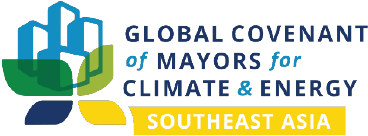January-February 2022 | The Secretariat of the Global Covenant of Mayors for Climate and Energy Southeast Asia (GCoM SEA) facilitated the first session of training for four GCoM SEA pilot cities in Indonesia, namely Medan, North Minahasa, Pontianak, and Tangerang. Each pilot city received an intensive four-day training session, with the following schedule: Pontianak (11-14 January 2022), North Minahasa (18-21 January 2022), Tangerang (24-27 January 2022), and Medan (31 January and 2-4 February 2022).
The training was conducted both in-person and virtually, which allowed more participants and speakers to attend the activity. The participants are members of the Climate Change Working Group (Pokja) from decision-makers to the technical team. They learned directly from GCoM SEA’s technical partner, the Center for Climate Risk and Opportunity Management in Southeast Asia and the Pacific of IPB University (CCROM-SEAP IPB).
Under the European Union-funded GCoM Asia Project, the four pilot cities are to receive technical assistance in developing their Climate Action Plan (CAP). The technical assistance is in the form of capacity-building activities or training on climate change adaptation and mitigation. The training is divided into three sessions: (1) Impact Potential (Adaptation) and Greenhouse Gas Inventory (Mitigation), (2) Climate Threats and Risks (Adaptation) and Baseline and Scenario (Mitigation), (3) Developing Climate Change Adaptation and Mitigation Plans.
In the first session of training, the Working Group members were grouped into the Adaptation and Mitigation groups. In the Adaptation Groups, they learned about policy on climate change adaptation; climate change and impact potential of the phenomenon; the concept of extreme climate analysis; the concepts of climate vulnerability, impact potential, and risks; and the Vulnerability Data Index Information System (Sistem Informasi Data Indeks Kerentanan or SIDIK). While on the Mitigation Group, they learned about policy on climate change mitigation; basic principles of GHG inventory; key category analysis; GHG inventory in energy/industry, Agriculture, Forestry and Other Land Use (AFOLU), and waste sectors; and National GHG Inventory System called SIGN SMART. The second session is planned to be conducted in April-May 2022 while the third is in June-July 2022.
This series of training is designed so that the Working Group members in particular and pilot city governments, in general, can increase their capacity in handling climate change, both in adaptation and mitigation activities. By the end of 2022, the four pilot districts/cities are targeted to complete the CAP so that they can be further facilitated to obtain funding to implement for innovative climate actions in their respective regions.
—
Written and reviewed by: Rona Ikram Putri








